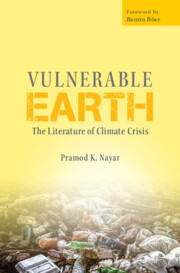1 - Introduction: The Literature of Climate Crisis
Published online by Cambridge University Press: 30 April 2024
Summary
Alexis Wright in The Swan Book (2013), a speculative novel set in the future, speaks of the ‘Mother catastrophe of flood, fire, drought and Blizzard’, thus replacing ‘Mother Nature’ with ‘Mother catastrophe’ (unpaginated). She thereby captures the urgency of climate crisis – well past the point of climate change – so that Nature now is catastrophic in nature.
In Homegoing (2016), Yaa Gyasi shows the transformation of an African community:
Ohene Nyarko came back a week later with the new seeds. The plant was called cocoa, and he said it would change everything. He said the Akuapem people in the Eastern Region were already reaping the benefits of the new plant, selling it to the white men overseas at a rate that was reminiscent of the old trade. (147–148)
Diane Ackerman writes in her The Rarest of the Rare (1997):
[T]he last recorded Caribbean monk seal was spotted in 1952. I was four years old, growing up in a small town in Illinois, playing in the plum orchard across from my house, and learning to count. I didn't know that an animal that had survived for fourteen million years was at that moment becoming extinct, nor that I would one day lament its passing. (Unpaginated)
Wright adopts an apocalyptic tone to speak of the climate-change-driven crisis. Yaa Gyasi describes the bioinvasion by an alien plant species of the African land, which will eventually alter its texture, social fabric and economy forever. Diane Ackerman's is an elegy for the disappeared species.
These excerpts represent three modes – the apocalyptic, the social realist and the elegiac, respectively – of speaking about climate crisis and its attendant losses, dangers and anxieties to address ‘the cultural challenge of climate change’.
The ‘cultural challenge of climate change’, write David Buckland et al., is ‘to craft a different language with which to understand the science of climate change, one that is more human and palatable for public consumption’ (Buckland et al. 2017: 97). Art, Buckland et al. propose, is ‘a possible means – it has the ability to reach into peoples’ psyches, where reasoned argument can often fail’ (98). Literature – as form, practice and institution – serves the same purpose, enabling a visualization of the human as a geological force that has irrevocably altered the planet, to adapt Dipesh Chakrabarty's influential characterization (2009).
- Type
- Chapter
- Information
- Vulnerable EarthThe Literature of Climate Crisis, pp. 1 - 20Publisher: Cambridge University PressPrint publication year: 2024



